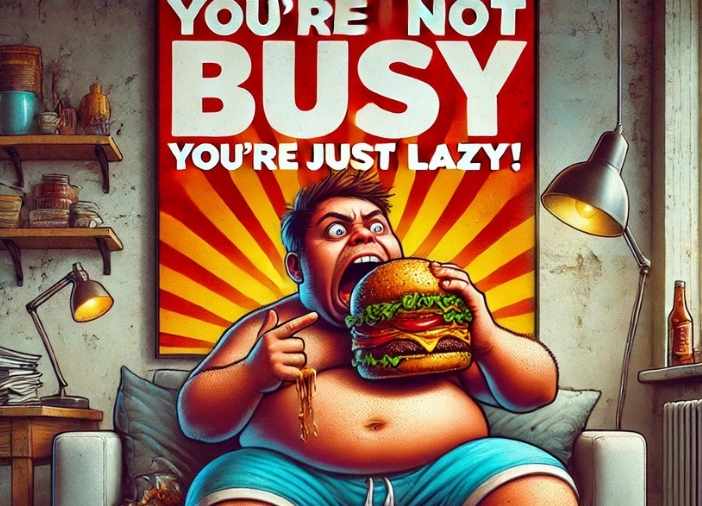
Time is the ultimate excuse. “I don’t have time to train.” “I’m too busy with work.” “There just aren’t enough hours in the day.” You hear it, you might even say it, but here’s the truth, it’s all lies.
You are not too busy; you’re just not prioritising your health. And that’s fine if your goals don’t involve longevity, energy, or being the leader people rely on. But if you want to excel in your career, your relationships, and your life, it starts with taking ownership of how you use your time.
Relentless Prioritisation: The Busy Myth
Being busy is not a badge of honour. It’s often just poor time management dressed up as importance.
Take a hard look at your week. How much time do you spend scrolling social media, watching Netflix, or attending pointless meetings that could have been an email? If you have time for those, you have time to train.
The CEOs, executives, and leaders I work with don’t magically have 30-hour days. They prioritise what matters and cut the crap. They block time in their schedules for training, treat it as non-negotiable, and make it happen no matter what.
You make time for what you value. If you say your health is important but never act on it, you’re lying to yourself.
Resilient Scheduling: Systems Beat Excuses
High performers don’t leave their health to chance. They create systems that make showing up easier than slacking off.
One of my clients, Sarah, is a managing director with two young kids and a packed schedule. Her excuse used to be, “I’m too busy to work out.” When we broke down her week, we found the problem wasn’t time, it was disorganisation.
Now, her workouts are scheduled like meetings. Her training kit is ready the night before, her gym sessions are short but focused, and her results? Energy through the roof, less stress, and sharper decision-making at work.
Systems don’t care if you feel tired or busy. They are resilient, and they get the job done.
Redefining Your Relationship with Time
If you truly believe you don’t have time, it’s time to redefine how you think about it.
You have 24 hours in a day. Seven days a week. That’s 168 hours. Let’s say you sleep for 56 of those. That leaves 112 hours. Even if you work 60 hours a week, you still have 52 hours left.
What are you doing with those hours? Watching TV? Stuck in a doom-scrolling loop? Saying you don’t have time to train isn’t a fact, it’s a choice.
Leaders who redefine their relationship with time don’t see health as a chore. They see it as an investment. Thirty minutes of training doesn’t take away from your productivity, it amplifies it. When you feel energised, focused, and strong, you lead better, think clearer, and recover faster.
How to Build Relentless, Resilient Systems for Your Health
If you’re tired of making excuses, here’s how to take control of your time and your health.
- Audit Your Week: Write down how you spend every hour for a week. Be brutally honest. You will see exactly where your time is going and where it is being wasted.
- Block Non-Negotiable Time: Treat your workouts like meetings. Put them in your diary, and don’t cancel.
- Plan Ahead: Lay out your gym kit, prep your meals, and decide what you are going to train before you step into the gym.
- Keep It Simple: You don’t need a two-hour workout. A focused 30 minutes, three times a week, will give you results if you are consistent.
- Leverage Dead Time: Use small pockets of time effectively. Stretch while on calls, do a quick bodyweight workout during a lunch break, or go for a walk while listening to a podcast.
- Hold Yourself Accountable: Track your progress. Whether it’s weight lifted, time spent training, or energy levels, keep a record to stay focused and motivated.
Why This Matters: Health Equals Impact
Your health is not just about looking good. It is about resilience. It is about having the energy to face challenges, the focus to make the right decisions, and the stamina to perform under pressure.
If you’re running on empty, skipping workouts, and surviving on caffeine and stress, you’re not just short-changing yourself—you’re short-changing your team, your family, and your business.
Leaders who prioritise their health don’t just lead better lives, they redefine what success looks like.
Final Thoughts
You have the time. The question is, are you going to use it? High performers don’t make excuses. They make decisions. They don’t wait for perfect conditions. They create systems that allow them to show up, no matter what.
If you want to lead from the front, start by leading yourself. Take control of your health, your time, and your life.
When you’re ready to stop lying to yourself and start building a resilient, relentless relationship with your time, drop me a message.
Until next week,
Glenn out!

